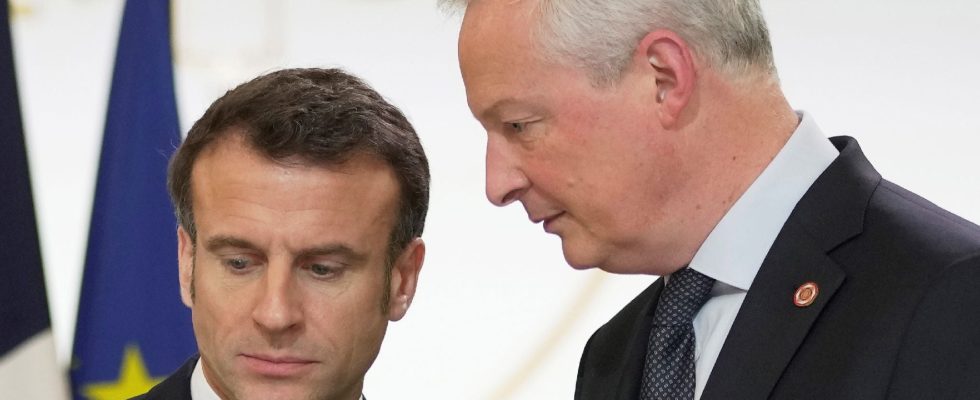A little music has been rising in recent weeks, in the wake of the expected – but no less resounding – announcement of a French public deficit of 5.5% in 2023. From the very liberal Alain Minc to the President of the National Assembly, Yaël Braun-Pivet, through Camille Landais, the deputy president of the Economic Analysis Council – a group of experts advising the Prime Minister -, several personalities have opened the door, even called, for an increase in taxation to fill the gap. gaping hole in state finances.
No way, Bruno Le Maire replies. In a column published on Tuesday April 2, in The echoesthe Minister of the Economy has, for once, stepped up to the plate to affirm that the government will not increase taxes by 2027. A dogma defended body and soul by Emmanuel Macron for 7 years and which has, in recent days, created some stir within its own majority.
Up to 75 billion euros to find
However, not touching the contributions of households and businesses to the state budget is a Herculean challenge. Bercy still intends to return below the 3% public deficit mark in 2027 in order to get back into the European lead. To do this, it will have to find at least 50 billion euros, according to the Court of Auditors, and between 70 and 75 billion euros in the opinion of many economists. “This means that it will be necessary either to reduce public spending, or to raise taxes, or to increase activity to increase tax revenue,” lists economist Xavier Ragot, president of the French Observatory of Economic Conditions (OFCE).
For the first option, several avenues are envisaged such as involving local authorities, initiating a new reform of unemployment insurance or even making budget cuts after a review of the expenditure of state operators, without us knowing really how much this will save. The second, therefore, is prohibited. Finally, there remains hope of an unexpected rebound in growth. Here again, the wishes of the executive will probably prove pious. For Xavier Ragot, there is “an ambiguity in the French debate”: “We see that the major concern of the French is purchasing power. We act as if spending cuts were not going to reduce the French budget. This will be unfortunately the case, just like tax increases,” he assures.
A truly impassable red line?
So why cling to this red line at all costs? “Historically, it seems easier to reduce public spending than to increase taxes. Taxpayers do not always perceive that the effect is the same on their purchasing power,” continues the expert. In his argument, Bruno Le Maire cites, for example, a savings rate that is already too high – close to 18% – which is in the high European range. “This can in fact discourage consumption, confirms François Ecalle, president of Fipeco. Concerning the taxation of the very rich, this can lead to tax exile. There are also many young people who go to work abroad for fear of ‘to be imposed too much’. This public finance expert was recently received in Bruno Le Maire’s office to present his point of view. According to him, the government will be able to respect its commitment only if it affects certain tax expenditures such as the home employment tax credit. “I would see a reduction in the ceiling. The higher it is, the less effective it is,” he adds.
As for the taxation of superprofits, which is coming back to the forefront, the former magistrate at the Court of Auditors judges that “these exceptional revenues are often cyclical. There is this exemplary case of shipowners with CMA CGM. Their results are very volatile, depend on freight prices and can even go into the red in some years. There may be something to do, but we should not have any illusions either, it will not necessarily bring in much. ” “We should not believe that the average wealth of companies has increased in France. We see that their margin rate has not changed, except for certain sectors, such as energy companies and transporters,” adds Xavier Ragot.
As the 2027 deadline draws closer, the State will in any case have to find solutions. Because the consequences could be massive. “If you maintain a high deficit, you remain under the threat of a change in the perception of French debt by investors, particularly in relation to that of Germany. You begin a vicious circle with an increase in interest rates , leading to financing difficulties,” explains economist Patrick Artus. According to him, “at this level, you cannot only implement homeopathic measures with simple budget cuts. We must reduce the role of the State and concentrate its action on the most useful expenditure such as research and development, education, energy transition…” A strategy which does not seem, for the moment, to be part of the government’s plans.
.
